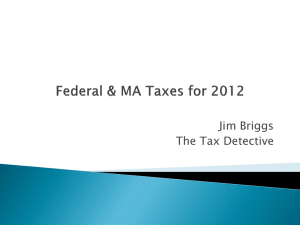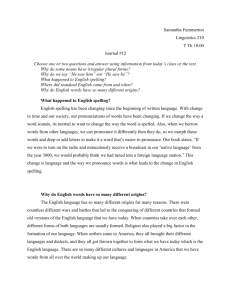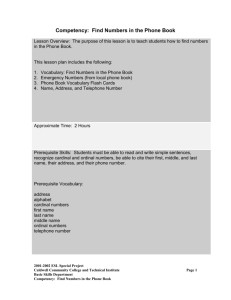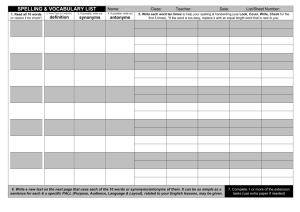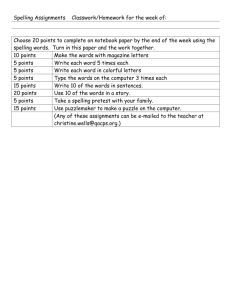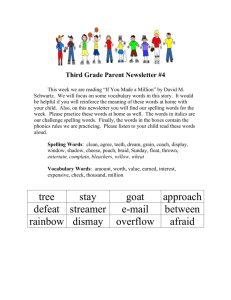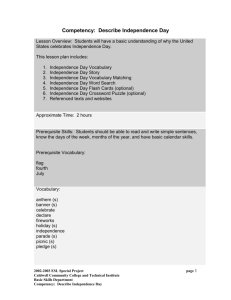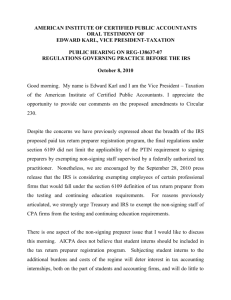ESL Special Project Lesson Title - NC-NET
advertisement
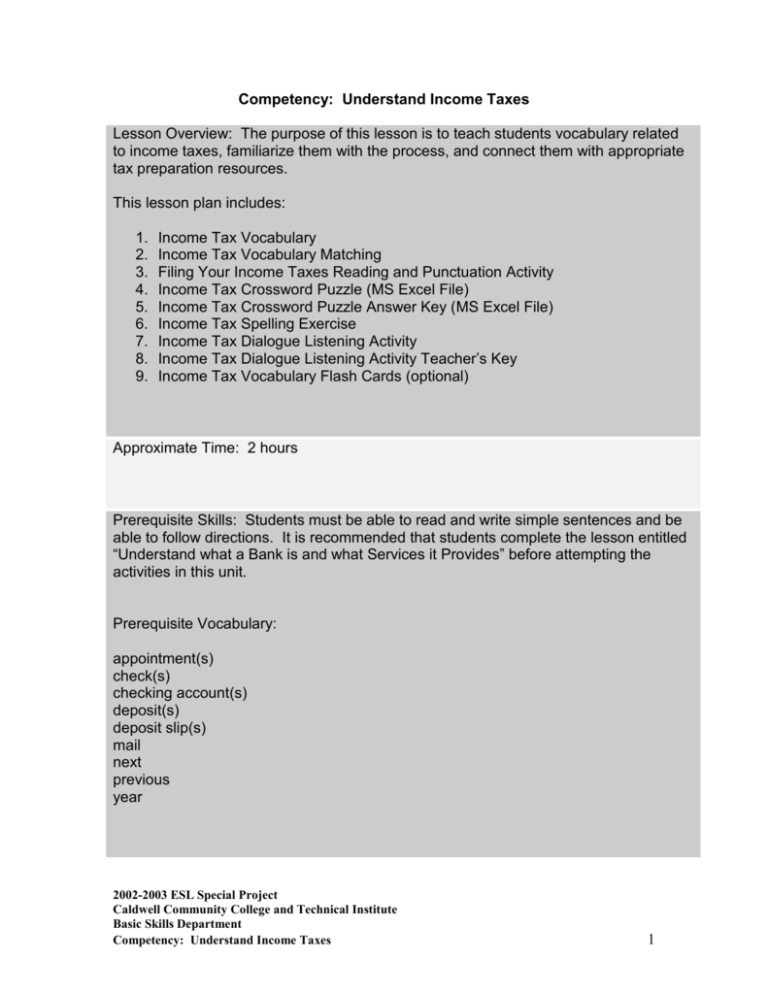
Competency: Understand Income Taxes Lesson Overview: The purpose of this lesson is to teach students vocabulary related to income taxes, familiarize them with the process, and connect them with appropriate tax preparation resources. This lesson plan includes: 1. 2. 3. 4. 5. 6. 7. 8. 9. Income Tax Vocabulary Income Tax Vocabulary Matching Filing Your Income Taxes Reading and Punctuation Activity Income Tax Crossword Puzzle (MS Excel File) Income Tax Crossword Puzzle Answer Key (MS Excel File) Income Tax Spelling Exercise Income Tax Dialogue Listening Activity Income Tax Dialogue Listening Activity Teacher’s Key Income Tax Vocabulary Flash Cards (optional) Approximate Time: 2 hours Prerequisite Skills: Students must be able to read and write simple sentences and be able to follow directions. It is recommended that students complete the lesson entitled “Understand what a Bank is and what Services it Provides” before attempting the activities in this unit. Prerequisite Vocabulary: appointment(s) check(s) checking account(s) deposit(s) deposit slip(s) mail next previous year 2002-2003 ESL Special Project Caldwell Community College and Technical Institute Basic Skills Department Competency: Understand Income Taxes 1 Vocabulary: April 15 employer(s) file/filing taxes filing electronically/electronic filing income tax(es) IRS (Internal Revenue Service) owe(s) tax form(s) tax preparer(s) tax refund(s) W-2 form(s) wage(s) Materials Needed: Whiteboard or flip chart, erasable marker, and handouts Equipment Needed: Multi-media computer with Internet access (optional) Activities: 1. Explain the purpose of the lesson. Ask the students what they already know about income taxes. Write their responses on the board or a flip chart. Have a discussion about why we pay taxes. Where does the money go? What does it pay for? Ask for students’ opinions. 2. Write the prerequisite vocabulary words on the board or flip chart. Discuss their meanings and answer any questions the students may have about them. 3. Introduce new vocabulary. a. Give students Income Tax Vocabulary handout. b. Pronounce the new vocabulary words one at a time and have the students repeat the words in unison. c. Pronounce the new vocabulary words one at a time and ask individual students to repeat the word. Repeat until the students can pronounce the words well. 2002-2003 ESL Special Project Caldwell Community College and Technical Institute Basic Skills Department Competency: Understand Income Taxes 2 d. Carefully go over each definition and make sure students understand what each vocabulary word means. e. Give students Income Tax Vocabulary Matching for vocabulary development. Review answers orally. 4. Give students Filling Out Your Income Taxes Reading and Punctuation Activity. Students will learn about filling out income tax forms while practicing their punctuation skills. 5. Give the students Income Taxes Crossword Puzzle for further vocabulary word practice and development. Students can do this activity alone or in small groups. An answer key is provided. 6. For additional vocabulary recognition practice, give students Income Tax Spelling Exercise. Use the Income Tax Spelling Exercise Answer Key to read each word to the students. Ask the students to circle the correctly spelled word that they hear. Students should work on this activity independently. Have students write the correct spelling of the words on the board and check answers. 7. For a listening and writing activity, give students Income Taxes Dialogue Listening Activity. This activity will give students the opportunity to see how some of the vocabulary words are used in an actual conversation with a tax preparer. Tell students that you are going to read the dialogue to them and that they are to fill in the blanks with the words they hear. a. Read from Income Tax Dialogue Listening Activity Teacher’s Key. Read the dialogue twice, the first time at a normal pace, the second time a little slower. b. Ask two students to read the parts A and B, supplying the missing words they heard. Write these on the board so that students may check their word accuracy and spelling. 8. For additional writing practice, have the students write about what they are planning to do with their income tax refund check. Assessment/Evaluation of Learning: 1. Teacher observation of students’ participation. 2. Evaluation of student worksheets. 2002-2003 ESL Special Project Caldwell Community College and Technical Institute Basic Skills Department Competency: Understand Income Taxes 3 Optional/Follow-up Activities: 1. Ask a professional tax preparer to come speak to the class about tax preparation and general information about income taxes. 2. Help your students find tax preparers in your community by having them look up telephone numbers using the yellow pages or using a website such as www.switchboard.com or www.yahoo.com. 3. Local agencies often offer free tax preparation services. Ask your city’s Chamber of Commerce if they are offering free tax help. Share this information with your students. 4. Ask students where they can pick up the necessary forms. (The local IRS office, post office, libraries, and some banks.) Many forms can also be downloaded and printed from the IRS website, at http://www.irs.gov. 5. Electronic filing information may be found at http://www.1040.com. 6. Comprehensive directory of online tax resources, including IRS publications, can be found at http://www.taxresources.com/. 7. Yahoo! Tax Center at http://taxes.yahoo.com/ offers state and federal forms, tips, and a tax calculator. Students might enjoy “predicting” what their tax return will be using the tax calculator. 8. Use Income Tax Vocabulary Flash Cards for further vocabulary development. 9. Have students write sentences using the vocabulary. 10. Have students in small groups list how tax money is used. Have groups share opinions with the rest of the class. 2002-2003 ESL Special Project Caldwell Community College and Technical Institute Basic Skills Department Competency: Understand Income Taxes 4
